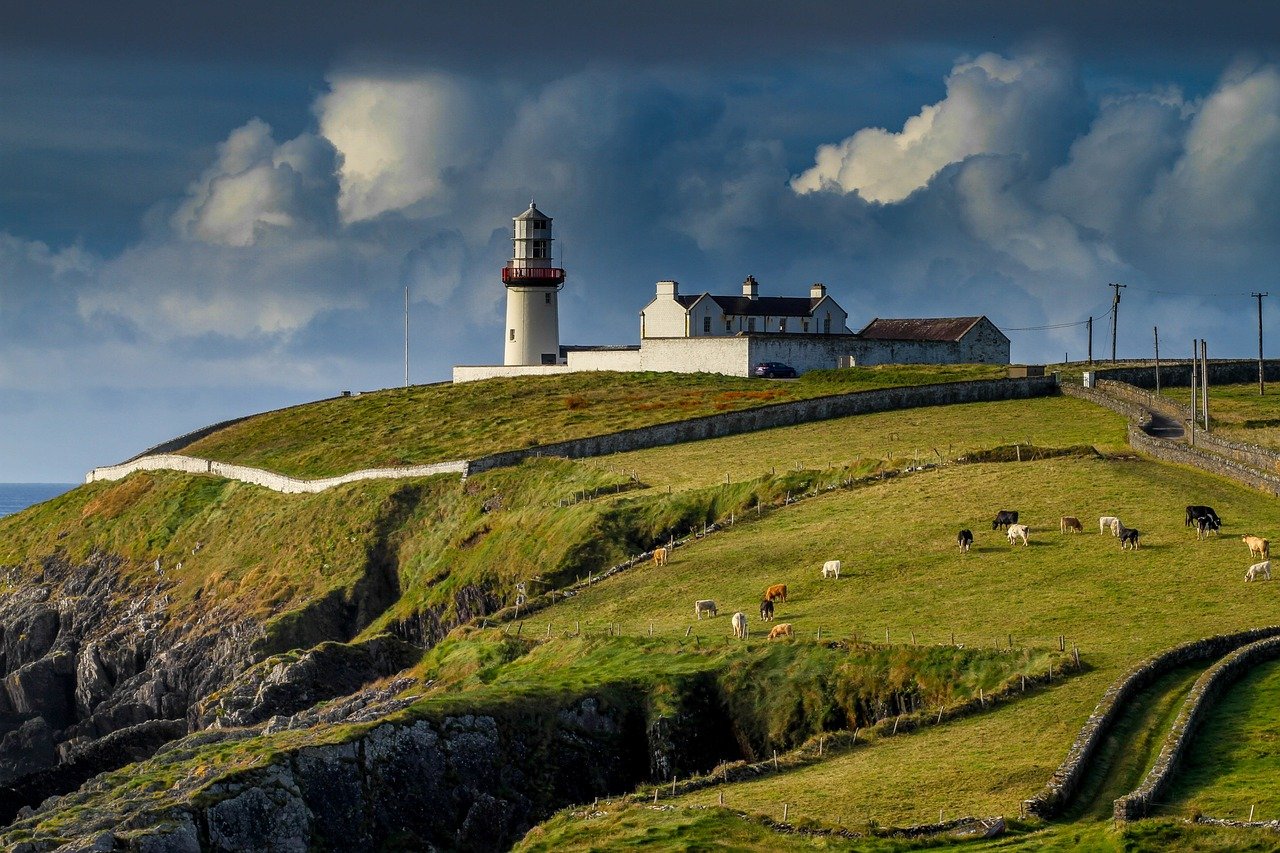
Imagine a world where crossing borders between Ireland and the UK is as easy as taking a stroll through your neighborhood park. Well, that dream has become a reality with the recent travel agreement between Ireland and the UK. This groundbreaking agreement has opened up new avenues for tourism, making it easier than ever for travelers to explore the vibrant landscapes, rich history, and unique cultures of both countries. Whether you’re an avid explorer or a casual wanderer, this article will delve into the impact of this travel agreement on tourism, highlighting the opportunities and experiences that await you on this exciting journey. So grab your passport and get ready to embark on an unforgettable adventure!

Overview of the Travel Agreement
Background of the travel agreement
The travel agreement between Ireland and the UK is a bilateral agreement that facilitates travel and tourism between the two countries. It was established to promote cooperation and strengthen the relationship between Ireland and the UK in various sectors, including tourism. The agreement sets out key provisions, scope, duration, and renewal terms to ensure a smooth travel experience for both Irish and British citizens.
Key provisions of the agreement
The travel agreement includes provisions such as visa-free travel, reciprocal healthcare arrangements, and mutual recognition of driver’s licenses. These provisions aim to eliminate barriers and streamline the travel process between Ireland and the UK, making it easier for tourists to explore both countries. Additionally, the agreement promotes cultural exchange, trade, and collaboration in tourism initiatives.
Scope of the agreement
The travel agreement covers various aspects of travel and tourism, including leisure travel, business travel, and educational travel. It applies to Irish and British citizens, allowing them to visit each other’s countries for tourism purposes without the need for a visa. The agreement also encompasses aspects of transportation, such as air and sea travel, ensuring smooth connectivity between Ireland and the UK.
Duration and renewal of the agreement
The travel agreement initially had a defined duration, but it has since been renewed multiple times, demonstrating the commitment of both countries to maintaining a favorable travel environment. The agreement allows for periodic reviews and amendments to adapt to changing circumstances and address emerging challenges. Regular consultations between the two governments ensure that the travel agreement remains relevant and beneficial for both parties.
Increase in Tourism Numbers
Historical statistics on tourism between Ireland and the UK
Over the years, tourism between Ireland and the UK has experienced significant growth. The historical statistics indicate a steady increase in the number of tourists visiting each country. According to data from the Irish Tourist Board and VisitBritain, there has been a consistent rise in tourist arrivals from the UK to Ireland and vice versa. This upward trend reflects the appeal and popularity of both countries as tourist destinations.
Factors contributing to the increase in tourism
Several factors have contributed to the increase in tourism between Ireland and the UK. Firstly, the travel agreement itself has played a crucial role by simplifying the travel process and removing certain barriers. This has encouraged more people to explore both countries without the hassle of obtaining a visa. Additionally, improved transportation links, such as cheaper flights and ferry services, have made travel more accessible and affordable.
Impacts on the tourism industry
The increase in tourism between Ireland and the UK has had a significant impact on the tourism industry in both countries. It has led to increased revenue for various sectors, including accommodations, restaurants, transportation, and tourist attractions. The higher demand for services has created job opportunities, benefiting the local economies. The tourism industry has also experienced growth in terms of infrastructure development, with new hotels, restaurants, and attractions being established to cater to the growing number of tourists.
Challenges faced in managing the surge in tourist numbers
Despite the positive impacts of increased tourism, managing the surge in tourist numbers has presented challenges for both Ireland and the UK. One of the main challenges is the strain on infrastructure and resources in popular tourist destinations. This has led to overcrowding, increased traffic, and pressure on local services. Balancing the need to accommodate tourists while preserving the natural and cultural heritage of these destinations is a key challenge that both countries must address.

Economic Benefits
Contribution to the local economy
The increase in tourism between Ireland and the UK has made a significant contribution to the local economies of both countries. Tourists spend money on accommodations, dining, shopping, transportation, and various tourist activities, injecting funds directly into the local economies. This inflow of tourism revenue supports businesses, stimulates economic growth, and creates a multiplier effect, benefiting a wide range of sectors.
Job creation
The tourism industry is a significant source of employment, and the increase in tourism between Ireland and the UK has created more job opportunities. From hotel staff and tour guides to restaurant servers and transportation providers, the demand for workers in the hospitality sector has increased. The job creation benefits local communities, particularly in areas heavily reliant on tourism, and helps reduce unemployment rates.
Boost in the hospitality sector
The surge in tourism has provided a significant boost to the hospitality sector in both Ireland and the UK. Hotels, guesthouses, bed and breakfasts, and other accommodation providers have experienced increased occupancy rates and higher revenues. This has allowed for additional investments in the sector, contributing to its overall growth and development. The thriving hospitality industry enhances the overall travel experience for tourists by ensuring quality accommodation and services.
Increased revenue for tourist attractions and accommodations
Tourist attractions and accommodations have benefited greatly from the increase in tourism. Popular landmarks, historical sites, museums, and natural attractions have experienced higher visitor numbers and, consequently, increased revenue. This financial boost enables these attractions to invest in maintenance, upgrades, and the creation of new experiences for tourists. Additionally, accommodations of all types have seen a rise in bookings, resulting in higher occupancy rates and greater profitability.
Cultural Exchange
Exchange of traditions, customs, and language
The travel agreement has facilitated a rich exchange of traditions, customs, and language between Ireland and the UK. Tourists from both countries have the opportunity to immerse themselves in each other’s cultures, witness unique traditions, and engage with locals. This cultural exchange enhances the travel experience and fosters a deeper understanding and appreciation of the shared heritage and history between Ireland and the UK.
Promotion of cultural understanding
By encouraging tourism, the travel agreement has promoted cultural understanding between Ireland and the UK. Tourists have the chance to interact with locals, learn about their way of life, and gain insights into different cultural practices. This fosters empathy, respect, and tolerance, strengthening the bond between the people of both countries. The promotion of cultural understanding also contributes to international harmony and peace.
Opportunities for cultural events and festivals
The increase in tourism has created opportunities for cultural events and festivals in both Ireland and the UK. These events showcase the artistic, musical, culinary, and cultural diversity of each country. Tourists can participate in local festivals, witness traditional performances, and celebrate alongside the locals. The presence of international tourists also adds vibrancy and a global perspective to these events, making them more inclusive and diverse.
Impact on local communities and preservation of cultural heritage
The influx of tourists has had a positive impact on local communities in Ireland and the UK. Tourism generates income for local businesses, supports community initiatives, and fosters pride in cultural heritage. Furthermore, the preservation of cultural heritage becomes a priority when it is recognized as a valuable asset for attracting tourists. This leads to increased efforts to protect historical sites, traditions, and customs, ensuring their longevity for future generations.

Promotion of Trade
Impact on business travel
The travel agreement has not only boosted leisure tourism but also had a positive impact on business travel between Ireland and the UK. The simplified travel process and visa-free access make it easier for professionals to travel for conferences, meetings, and business collaborations. The increased business travel contributes to the growth of trade between the two countries, fostering economic ties and encouraging investment.
Expansion of export opportunities
The increase in tourism creates more opportunities for businesses to export products and services. Local goods, such as handmade crafts, artisanal food, and traditional products, gain exposure to a wider market through tourist purchases. This opens up new avenues for small businesses and artisans to expand their operations, reach customers abroad, and increase their export revenue. The expansion of export opportunities benefits the local economy and promotes entrepreneurship.
Encouragement of investment and partnerships
The positive travel environment established by the agreement encourages investment and partnership opportunities between Ireland and the UK. With increased mobility and ease of doing business, entrepreneurs and investors can explore opportunities in both countries more readily. This fosters innovation, collaboration, and the exchange of knowledge and expertise, leading to mutually beneficial partnerships and economic growth.
Strengthening of economic ties between Ireland and the UK
The travel agreement has played a pivotal role in strengthening economic ties between Ireland and the UK. By facilitating tourism, business travel, and trade, the agreement promotes bilateral engagement and cooperation. It encourages cross-border investments, joint ventures, and research collaborations, fostering a deeper integration of the economies of both countries. The strengthened economic ties create a stable foundation for future growth and prosperity.
Enhancement of Travel Experiences
Greater accessibility between the two countries
The travel agreement has led to greater accessibility between Ireland and the UK. The removal of visa requirements and simplified travel procedures mean that travelers can easily move between the two countries without hassle. This accessibility has opened up opportunities for more people to explore new destinations, experience different cultures, and create lasting memories.
More choices for transportation
Improved transportation links have accompanied the increase in tourism between Ireland and the UK. Airlines have increased the number of flights, and ferry services have expanded, offering more choices for travelers. Whether by air or sea, tourists have greater flexibility in choosing their preferred mode of transportation, which enhances their travel experiences. The increased competition among transportation providers has also led to more affordable options for travelers.
Increased affordability of travel
The travel agreement, coupled with increased competition in the tourism industry, has made travel between Ireland and the UK more affordable. Tourists have access to a wider range of accommodation options at different price points, allowing them to choose according to their budget. Moreover, the availability of discounted flights and special travel packages has made it easier for travelers to plan and afford their trips. The increased affordability has made travel more inclusive and accessible to a larger segment of the population.
Diversification of travel packages and itineraries
With the rise in tourism, there has been a diversification of travel packages and itineraries for tourists visiting Ireland and the UK. Tour operators, travel agencies, and online platforms offer a plethora of options, catering to various interests, preferences, and budgets. Whether one seeks a cultural tour, outdoor adventure, historical exploration, or a culinary experience, there are numerous tailor-made packages and itineraries available. This diversity allows travelers to personalize their trips, ensuring a unique and memorable experience.
Boost to Rural Tourism
Opening up of lesser-known destinations
The increase in tourism between Ireland and the UK has brought attention to lesser-known destinations, particularly in rural areas. Tourists are venturing off the beaten path to explore the natural beauty and tranquility of the countryside, picturesque villages, and remote landscapes. This exposure has helped boost the local economies of these rural areas, encouraging the development of tourism infrastructure and services that cater specifically to the needs and interests of these visitors.
Positive impact on rural economies
Rural tourism has experienced a positive impact due to the increase in tourist numbers. The revenue generated from tourism activities benefits local businesses, farmers, artisans, and entrepreneurs, stimulating economic growth in rural areas. The demand for accommodation, local products, and unique experiences creates opportunities for locals to participate in the tourism industry and diversify their income streams. This economic boost helps to sustain rural communities and preserve their way of life.
Preservation of rural landscapes and natural beauty
The focus on rural tourism resulting from the increase in tourism between Ireland and the UK has brought attention to the preservation of rural landscapes and natural beauty. Tourists, often appreciating the unspoiled nature and breathtaking scenery, contribute to the conservation efforts of these areas. The revenue generated from tourism can be reinvested in maintaining and protecting the environment, ensuring the sustainability of rural tourism practices and the longevity of these landscapes for future generations.
Development of sustainable tourism practices in rural areas
The rise in rural tourism has also led to the development of sustainable tourism practices in rural areas. Local communities recognize the need to balance tourism with the preservation of the natural and cultural heritage of their regions. They implement measures such as responsible tourism guidelines, eco-friendly accommodations, and community-led initiatives to minimize the impact on the environment while maximizing the benefits of tourism. This focus on sustainability ensures the long-term viability and attractiveness of rural tourism destinations.
Environmental Implications
Potential increase in carbon emissions
The increase in tourism between Ireland and the UK may lead to a potential increase in carbon emissions. Travelers moving between the two countries contribute to greenhouse gas emissions, particularly when using air transportation. This poses environmental challenges, as carbon emissions contribute to climate change and impact the overall sustainability of the tourism industry. It is crucial for both countries to prioritize sustainable travel options, such as promoting public transportation and encouraging energy-efficient practices within the tourism sector.
Pressure on natural resources
The surge in tourist numbers can place significant pressure on natural resources in popular tourist destinations. Increased water usage, waste generation, and energy consumption strain the local infrastructure and ecosystems. It is essential for destination management organizations, local authorities, and tourism stakeholders to collaborate in implementing sustainable resource management practices. This can include measures such as water conservation, waste recycling programs, and renewable energy initiatives to minimize the environmental impact of tourism.
Management of waste and pollution
Managing the waste and pollution generated by the increase in tourism is a crucial consideration for both Ireland and the UK. The higher volume of tourists leads to greater waste generation, including plastic waste, which can have detrimental effects on the environment if not managed properly. Implementing effective waste management systems, promoting recycling initiatives, and raising awareness among tourists can help mitigate the environmental impact and preserve the natural beauty of tourist destinations.
Promotion of sustainable tourism practices
The increase in tourism provides an opportunity to promote sustainable tourism practices. Ireland and the UK can encourage responsible behavior among tourists, such as minimizing single-use plastics, supporting local businesses, and respecting natural habitats and wildlife. Destination management organizations, tour operators, and accommodations can adopt sustainable certifications, implement green policies, and offer eco-friendly alternatives to encourage sustainable tourism practices. By prioritizing the environment, both countries can ensure the long-term sustainability of their tourism industries.
Collaborative Tourism Initiatives
Joint marketing campaigns
To capitalize on the increase in tourism, Ireland and the UK can collaborate on joint marketing campaigns. By pooling their resources, they can promote travel packages that encompass both countries, highlighting the unique experiences and attractions available. These campaigns can target different markets and segments, ensuring a wider reach and attracting more tourists to explore both Ireland and the UK. The joint marketing efforts will enhance the visibility and competitiveness of the two countries as tourism destinations.
Cross-border collaborations
Cross-border collaborations between tourism authorities, industry associations, and businesses can further enhance the travel experience between Ireland and the UK. By sharing best practices, knowledge, and expertise, both countries can improve the quality of services, develop new tourism products, and address common challenges. Collaboration can also include joint training programs, exchange programs for tourism professionals, and the establishment of cross-border tourism routes to encourage travelers to explore multiple destinations.
Mutual assistance in crisis management
In the face of crises, such as natural disasters, pandemics, or terrorism threats, mutual assistance and cooperation between Ireland and the UK is crucial. By sharing information, coordinating response efforts, and providing support to affected tourists, both countries can ensure the safety and well-being of travelers. This collaboration enhances the resilience of the tourism industry and builds confidence among tourists, reaffirming the commitment of both countries to the welfare of visitors.
Shared resources for tourism development
To optimize tourism development, Ireland and the UK can explore opportunities for sharing resources. This can include joint research initiatives, data sharing, and the establishment of common platforms for tourism planning and development. By leveraging each other’s strengths and expertise, both countries can streamline processes, enhance visitor experiences, and allocate resources more effectively. The sharing of resources promotes efficiency, innovation, and continuous improvement in the tourism sector.
Future Considerations
Brexit’s impact on the travel agreement
The implications of Brexit on the travel agreement between Ireland and the UK have been a topic of concern. As the UK formally withdrew from the European Union, changes in visa requirements, border controls, and trade regulations could potentially impact the travel agreement. It will be essential for both countries to engage in negotiations and uphold the preservation of a favorable travel environment, ensuring that tourism between Ireland and the UK remains accessible and mutually beneficial.
Potential changes in visa requirements
Brexit may lead to potential changes in visa requirements for tourists traveling between Ireland and the UK. As new arrangements are negotiated, both countries must strive to maintain visa-free travel or develop streamlined visa processes that do not hinder tourism. Efforts should be made to minimize any bureaucratic barriers and ensure the continued facilitation of travel between Ireland and the UK.
Opportunities for further cooperation
The travel agreement between Ireland and the UK presents opportunities for further cooperation in various areas. These can include joint research projects on tourism trends and preferences, collaborative marketing campaigns targeting specific segments, and the development of sustainable tourism practices. By leveraging the shared heritage, knowledge, and resources, both countries can explore new avenues for collaboration, leading to innovative solutions and sustainable growth in the tourism industry.
Challenges and areas for improvement
While the travel agreement has been successful in fostering tourism between Ireland and the UK, challenges and areas for improvement remain. Managing the surge in tourist numbers, preserving the natural and cultural heritage, and addressing sustainability concerns requires ongoing efforts and collaboration. Both countries should focus on destination management, infrastructure development, and stakeholder engagement to ensure the long-term sustainability and quality of the tourism experience.
In summary, the travel agreement between Ireland and the UK has had a profound impact on tourism, economy, culture, and trade. It has brought increased accessibility, affordability, and diversity to travel experiences, benefiting both countries. However, it is crucial to address challenges such as environmental implications and the potential changes brought on by Brexit. Through collaborative initiatives and continuous improvement, Ireland and the UK can further enhance their travel agreement and foster a thriving, sustainable, and mutually beneficial tourism industry.





